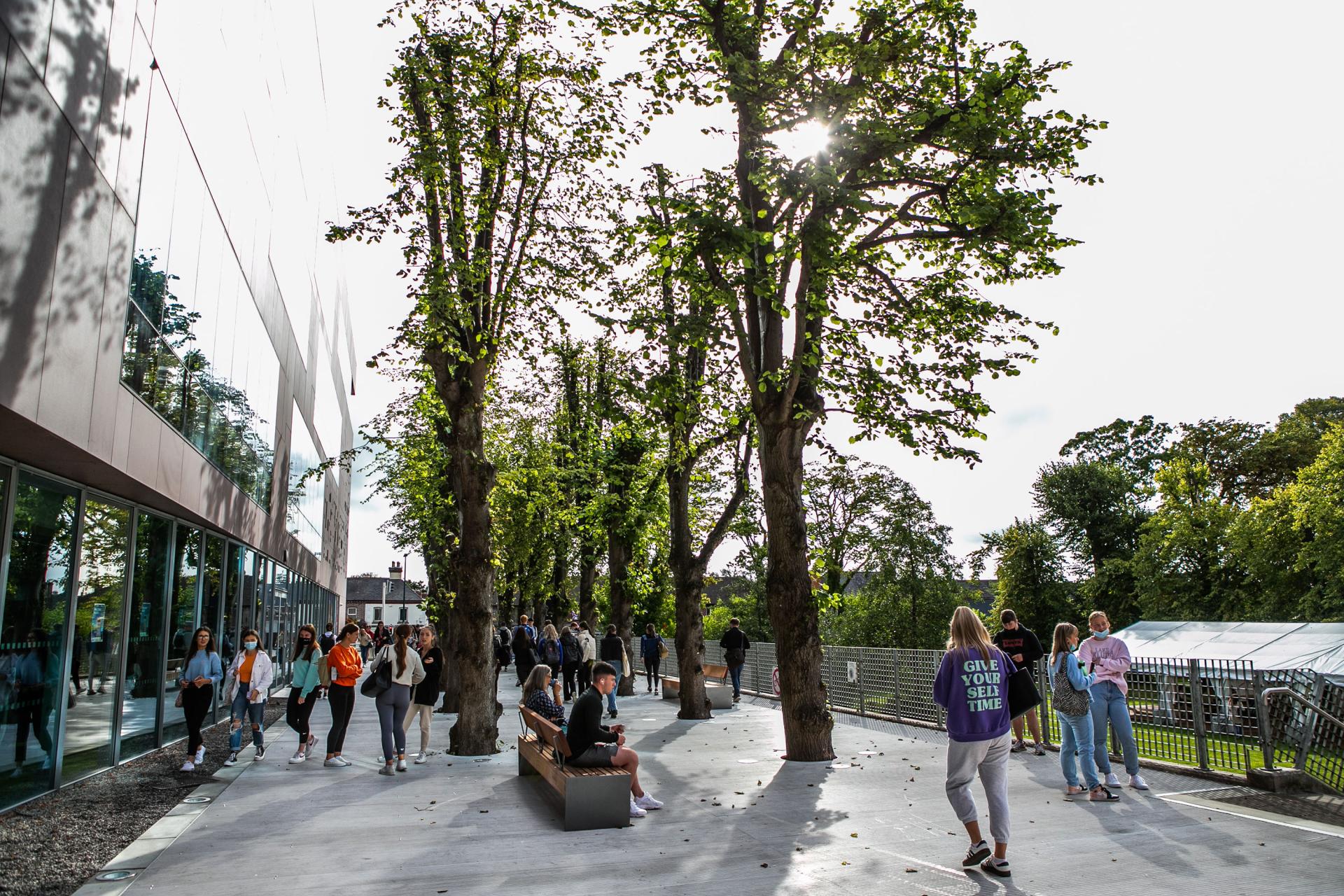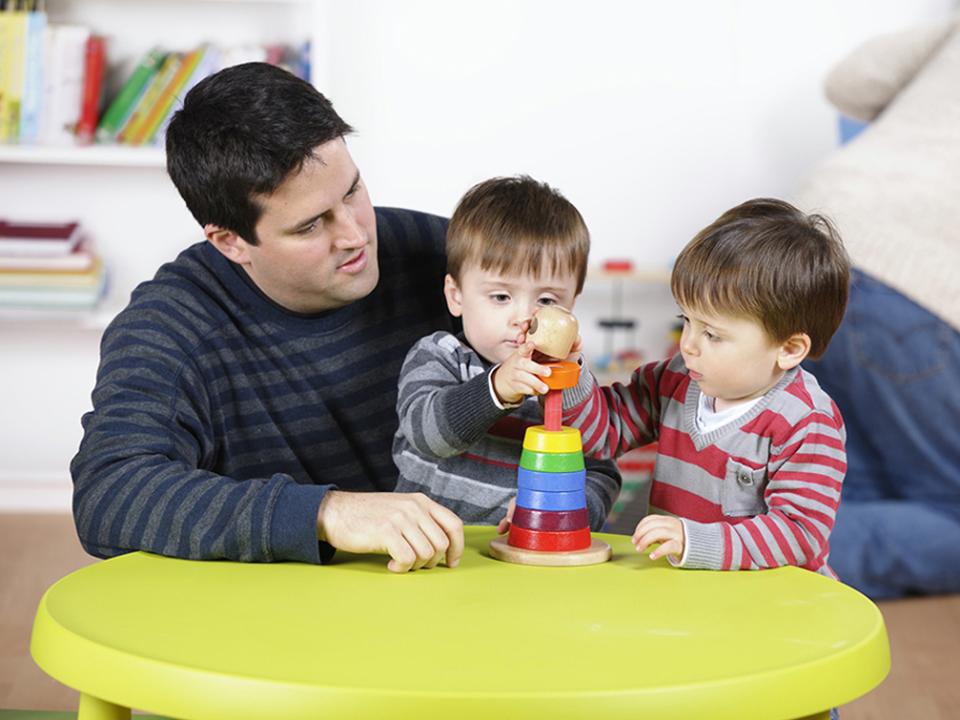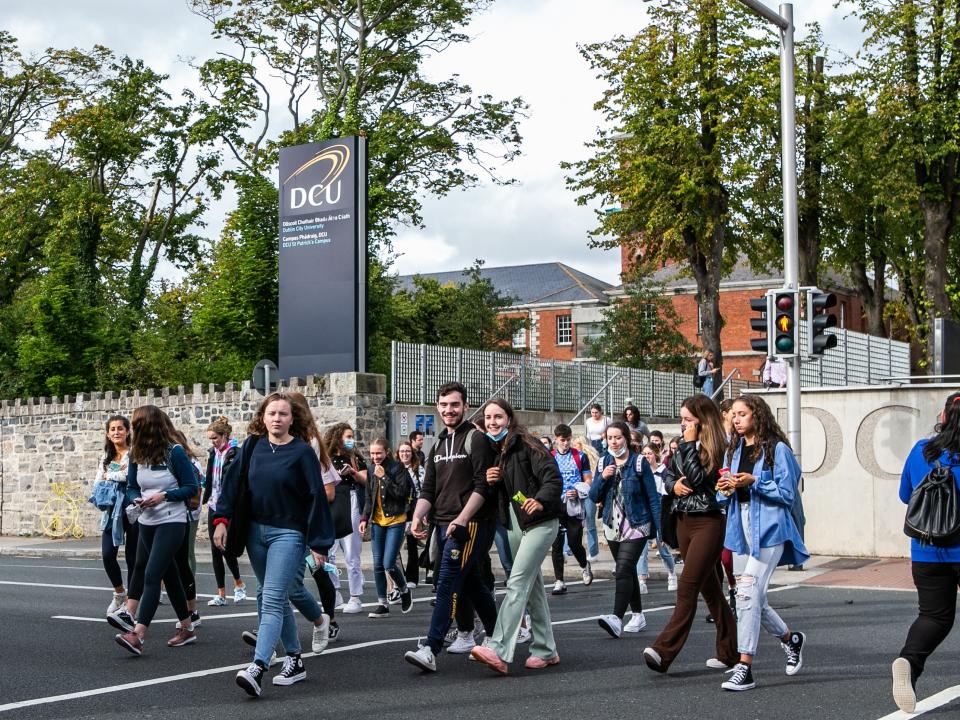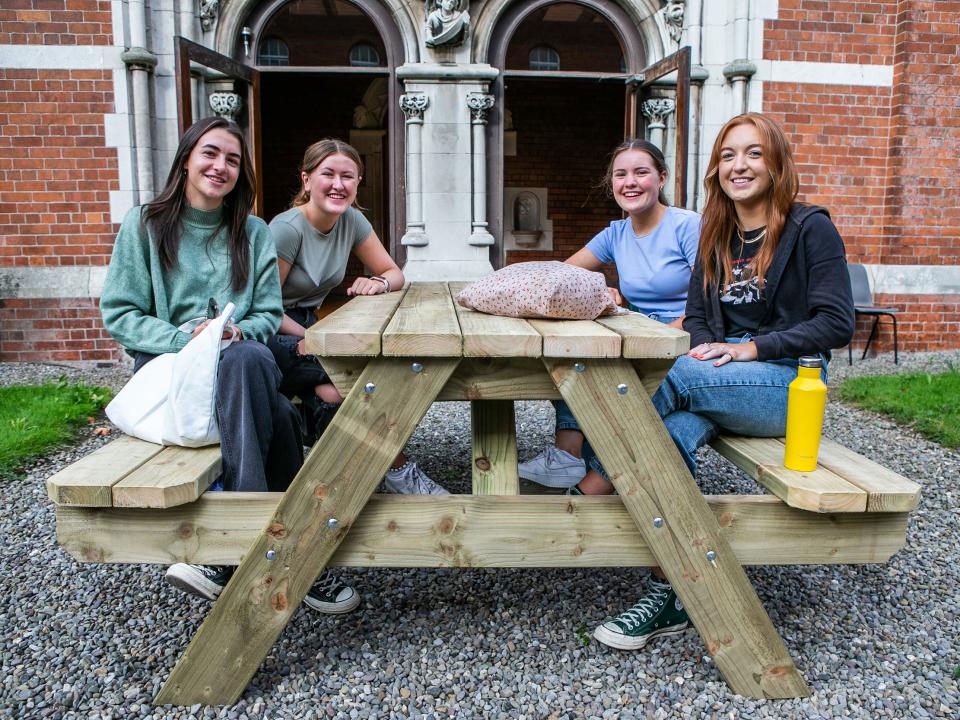Overview
Mar mhúinteoir bunscoile, is féidir leat fíordhifríocht a dhéanamh - meon agus forbairt phearsanta leanaí a threorú agus a thacú. Cabhróidh an cúrsa seo leat a bheith i do ghairmí múinteoireachta oilte cruthaitheach
Ag Foghlaim a Mhúineadh, Ag múineadh chun foghlaim
Tabharfaidh an Baitsiléir san Oideachas (Bunmhúinteoireacht) gach eolas duit ar na hábhair a bheidh le múineadh chomh maith leis na scileanna ceannaireachta agus cumarsáide a theastaíonn chun iad a mhúineadh.
Cuidíonn an cúrsa leat tuiscint a fháil ar an gcaoi a bhfoghlaimíonn leanaí, agus tugann sé na huirlisí duit chun do mhic léinn a spreagadh sa seomra ranga. Ina theannta sin, méadófar ar do chuid eolais agus tuiscint ar an domhan thart ort trí léachtaí iontacha idirghníomhacha
Féadfar suas le deich faoin gcéad de na hionaid ar chlár an Bhaitsiléara Oideachais a choinneáil d’iarratasóirí Gaeltachta, i.e. ní mór d’iarratasóirí cónaí a bheith orthu i Limistéar Pleanála Teanga Gaeltachta agus an Ghaeilge a bheith in úsáid mar ghnáth-theanga teaghlaigh acu. Roghnaíonn an scoláire DC003 le cur in iúl d’oifig an CAO gur iarratasóir Gaeltachta é/í. Déanann an CAO teagmháil leis an Roinn Turasóireachta, Cultúir, Ealaíon, Gaeltachta, Spóirt agus Meán chun a dheimhniú gur Iarratasoir Gaeltachta atá ann/inti. Tá eolas breise maidir le Riachtanais Iontrála d'Iarratasóirí Gaeltachta ar fáil anseo. Féach Doiciméad 0034/2021
DCU People
Careers & Further Options
Careers
Tugann an cúrsa seo níos mó ná bealach díreach isteach chuig an mbunmhúinteoireacht, tá bealach chuig gairmeacha eile chomh maith
Bíonn an-iarracht ag fostóirí ar chéimithe Ollscoil Chathair Bhaile Átha Cliath. Oibríonn ár gCéimithe i dtimpeallachtaí éagsúla ó chomhlachtaí ilnáisiúnta móra go FBManna, gnólachtaí teaghlaigh agus gnólachtaí nuathionscanta ar fud gach earnála.
Tá roinnt tionscnamh foghlama agus forbartha i bhfeidhm ag Seirbhís Gairmeacha Ollscoil Chathair Bhaile Átha Cliath dár gcuid mac léinn, a thugann na scileanna dóibh a theastaíonn le haghaidh slí bheatha rathúil.
Entry Requirements
In addition to the general entry requirements for admission to the university the following entry requirements apply: Minimum of H5 in no fewer than three subjects and a minimum of O6/H7 in three other subjects, to include minimum of H3 in Irish; O4 or H7 in English; O4 or H7 in Mathematics. Applicants must be resident in a Gaeltacht Language Planning area.
Minimum age of 16 by 15th January in the year of entry.
DES 2025 entry requirements for non-mature applicants is available here and Irish version available here.
Ní mór d’iarratasóirí DC003 cónaí a bheith orthu sa Ghaeltacht mar a aithnítear go hoifigiúil í agus an Ghaeilge a bheith in úsáid mar ghnáth-theanga teaghlaigh acu.
In addition to the general entry requirements for admission to the university the following entry requirements apply: Six subjects must be presented, at least three at GCE A Level with the remaining subjects at GCE AS or GCSE Level. Applicants must present the following subject requirements: GCSE C in both English and English Literature or GCSE B in either English or English Literature; GCE A Level C in Irish; GCSE D Level in Additional Mathematics or Grade GCSE C in Mathematics; GCE A Level C in two further subjects; GCSE C in one other subject.
DES 2025 entry requirements for non-mature applicants is available here and Irish version available here.
No Entry Path
Mature applicants must apply to CAO by 1st February. In March, those meeting the eligibility criteria will receive an email from the CAO with a link to a supplementary form and instructions for completing and submitting this form. Applicants who meet the eligibility criteria and complete the supplementary form will be invited to attend a general interview and oral Irish test. Interviews/oral Irish exams will take place on Wednesday, 7th May 2025.
Applicants for this programme must meet the eligibility criteria as set out by DES* here. (Irish version here).
Minimum of H5 in no fewer than three subjects and a minimum of O6 or H7 in three other subjects, to include minimum of H4 in Irish; O4 or H7 in English; O4 or H7 in Mathematics.
No Entry Path
No Entry Path
Course Structure
Socrúchán
Caitheann mic léinn am i scoileanna i ngach bliain, le socrúcháin sínte i mBlianta 3 agus 4. Tosóidh tú trí bhreathnú ar an múinteoir ranga agus de réir a chéile beidh tú in ann teagasc ar feadh an lae ar fad. Tabharfaidh tú cuairt ar an nGaeltacht ar feadh ceithre seachtaine freisin.
Speisialtóireacht
Cuireann an BEd ar do chumas speisialtóireacht a dhéanamh i bpríomhréimsí foghlama.
I mBliain 1 roghnóidh tú trí cinn ar a mhéid as Béarla, Gaeilge, Tíreolaíocht, Stair, Matamaitic, Ceol agus Léann an Reiligiúin. Is féidir leat leanúint ar aghaidh le ceann amháin díobh seo mar Mhórspeisialtacht i mBlianta 2 go 4.
Mar mhalairt air sin, is féidir go gcinnfidh tú Oideachas Luath-Óige, Foghlaim Dhigiteach, Oideachas Eolaíochta, Forbairt Daonna, Corpoideachas, Oideachas Litearthachta, Geo-Fhoghlaim, nó Oideachas Speisialta agus Cuimsitheach a roghnú. (Tá teorainn le líon na n-áiteanna ar roinnt speisialtachtaí agus tá roghanna faoi réir athraithe).
I mBliain 1 agus i mBliain 2, clúdaíonn na scoláirí na bunghnéithe a theastaíonn don teagasc. De réir a chéile tuigfidh tú an dóigh a smaoiníonn agus a bhfoghlaimíonn leanaí ar bhealaí gníomhacha. Ullmhóidh do chúrsaí curaclaim tú le hábhair uile churaclam na bunscoile a mhúineadh trí úsáid a bhaint as cur chuige a fhorbraíonn tuiscint agus inspreagadh na bpáistí. Déanfaidh tú modúil freisin i Síceolaíocht, Fealsúnacht, Socheolaíocht an Oideachais agus Stair an Oideachais
I mBliain 3, déanfaidh tú athbhreithniú ar a bhfuil foghlamtha agat go dtí seo agus cuirfidh tú i bhfeidhm é i gcásanna éagsúla. Méadóidh do thuiscint ar chomhthéacsanna an tseomra ranga agus conas eispéiris shaibhre foghlama a phleanáil. Foghlaimeoidh tú conas oibriú le leanaí ar bhealaí daonlathacha agus conas a chuireann ar a gcumas dul i ngleic leis an domhan ar bhealach eiticiúil.
Díríonn Bliain 4 ar do shaineolas a dhoimhniú. Cuirfear deiseanna ar fáil duit a bheith ag obair i bpobal scoile agus macnamh a dhéanamh ar smaointe móra san oideachas, mar shampla, cheartas agus ionchuimsiú sóisialta. Tabharfaidh tú faoi thionscadal taighde freisin.
Fees and Funding
Fees
How To Apply
Applicants presenting EU School Leaving: Apply through the Central Applications Office (CAO) by 1st February or 1st May
Apply through the CAO by 1st February. In March, those meeting the eligibility criteria; those intending to sit the Leaving Certificate and applicants presenting GC(S)E in 2025 must complete a supplementary form. All eligible applicants will be contacted and sent a supplementary form which must be completed and returned. Candidates will then be invited to attend a general interview and oral Irish examination which will take place one after the other via zoom. Interviews/oral Irish exams will take place on Wednesday, 7th May 2025.
Applicants sitting examinations in 2025 will be included in this invitation provided they meet the minimum entry requirements or are intending to sit Leaving Certificate/GC(S)E examinations before August 2025.
Applicants will be offered places in order of merit. Candidates who have failed the interview on two previous occasions are not eligible to reapply.
Please note that mature applicants can apply either on mature grounds or on points alone or both.
Information regarding the DES 2025 Mature Entry Requirements is available here. (Irish version here).
- No Entry Path
Please see Application Procedures or E-mail ugadmissions@dcu.ie.
Candidates required to apply through the CAO can apply online at www.cao.ie
Life On Campus
At DCU, our students can expect a unique campus experience. We are known for our excellent teaching and learning facilities, our active clubs and societies, and our great social and sporting facilities. All this makes DCU an exciting place to be.
DCU has three academic campuses; Glasnevin, St. Patrick’s and All Hallows (both in Drumcondra), all close to Dublin City centre.
They can be reached by public transport, Dublin Bus and Bus Éireann, with our Drumcondra campuses a ten minute walk from Drumcondra Train Station. Glasnevin is a 20 minute walk from St Patrick’s and All Hallows. They are also linked by Dublin Bus.
Each campus has a library (O’Reilly, Cregan and Woodlock Hall), study spaces, restaurants, and on-campus residencies. There are sports facilities on Glasnevin and St. Patrick’s, and there is a dedicated sports campus, St Claire’s, located near Glasnevin on the Ballymun Road.
DCU’s 19,000 students have access to exceptional teaching and learning facilities across our three academic campuses.
These include modern learning theatres, research centres, a new media and TV studio, radio/podcast studios, computer suites and advanced labs in the areas of Languages, Engineering, Physics, Chemistry and Biotechnology, as well as a Sports Performance centre and a training hospital ward. In 2021, we opened our first virtual reality ‘Leadership Lab’, which is located in our Business School.
We continue to improve and update our facilities. For example, construction of a new world-class STEM facility is underway on the Glasnevin campus. With capacity for an extra 3,000 STEM students, this facility will advance DCU’s international reputation for excellence in science and health, computing and engineering disciplines.
Studying in DCU isn’t just about course work. The university is rich in student life and activities.
There are more than 140 clubs and societies for students in DCU, with ‘Clubs & Socs’ days taking place on both the Glasnevin and Drumcondra campuses at the start of the academic year. They span everything from rugby to rock climbing, anime to jazz.
For many students, sport is an important part of the DCU experience. DCU’s Sports Complex boasts a 25 metre swimming pool, fitness centre gym, all-weather pitches and squash courts, as well as soccer, GAA and rugby pitches. DCU Dóchas Éireann, the university’s GAA club, is the largest third level Gaelic Games club in the country. Meanwhile, DCU Athletics has been Ireland’s highest achieving university club for many years. And DCU has dozens of other clubs to get involved in, from Archery to Weightlifting.
The Glasnevin campus is home to our purpose built, state-of-the-art student centre, The U, which serves the needs of a rapidly growing student body. Here, you will find the Student Leadership and Lifeskills Centre, performing arts and cultural spaces for students and the wider community, and the Entrepreneurship and Innovation Hub. Also located on our Glasnevin campus is The Helix, our renowned performing arts centre.
On our St Patrick’s campus, we have the Java Student Hub, a vibrant, warm and welcoming space where students can meet for coffee, play music, use the projector to watch events, or just relax. The walls of the Java Hub were designed based on the cultural history of St Patrick’s Campus, including the special references to the notable sporting history and history of the arts.
We have a number of academic, professional and social supports for students.
Student Advice & Learning Skills Centre - Offers a wide range of supports and services to students and advice
The Writing Centre - drop-in writing workshops for students through the academic year
Maths Learning Centre - provides maths support for students of all ability levels with maths modules
Student Learning - facilitate the transition from passive to active learning for students at DCU, by teaching study skills, nurturing critical thinking and building student confidence.
Careers work with students to help them on their professional journey into graduate employment.
Our student support team offers a comprehensive support programme, helping students make that all important transition into university life and focusing on building confidence and skills which are key to success at third level.

DCU St Patrick's Campus
FAQs
What courses are offered by the DCU Institute of Education?
DCU Institute of Education brings together students of education and provides a rich menu of undergraduate courses across all sectors from early childhood, to primary and post-primary and further and higher education. We offer a range of taught and research postgraduate courses at doctoral, masters, diploma and certificate level and have a distinguished record in providing continuing professional development.
Is there Garda vetting for students who study DCU Institute of Education courses?
Garda vetting is required for all students who have unsupervised access to children and vulnerable adults as part of their studies at DCU. Applicants must successfully pass the Garda vetting process in order to complete the registration process.
What are the potential teaching pathways for primary, post-primary and further education and training offered by DCU?
Primary Teaching Pathways
Undergraduate*
Postgraduate**
- Professional Master of Education (Primary Teaching) - DC970
* Please ensure that you consult minimum entry requirements and CAO points for all undergraduate programmes
** Please ensure that you consult minimum entry requirements for all postgraduate programmes
Post-Primary Teaching Pathways
Undergraduate*
- Bachelor of Religious Education & English or History or Music - DC010 | DC011 | DC012
- Bachelor of Education in Gaeilge and French or German or Spanish - DC013
- Bachelor of Education in Technology, Engineering and Graphics - DC015
- Bachelor of Science (Hons) in Science Education - DC203
- Bachelor of Science (Hons) in Physical Education with Biology - DC205
- Bachelor of Science in Physical Education with Mathematics - DC206
Postgraduate**
- Professional Master of Education (Post-Primary Teaching) - DC905
* Please ensure that you consult minimum entry requirements and CAO points for all undergraduate programmes
** Please ensure that you consult minimum entry requirements for all postgraduate programmes
Further Education and Training Teaching Pathways
Undergraduate*
- BSc (Hons) in Education and Training (Further, Adult and Continuing Education) - DC235
* Please ensure that you consult minimum entry requirements and CAO points for all undergraduate programmes





